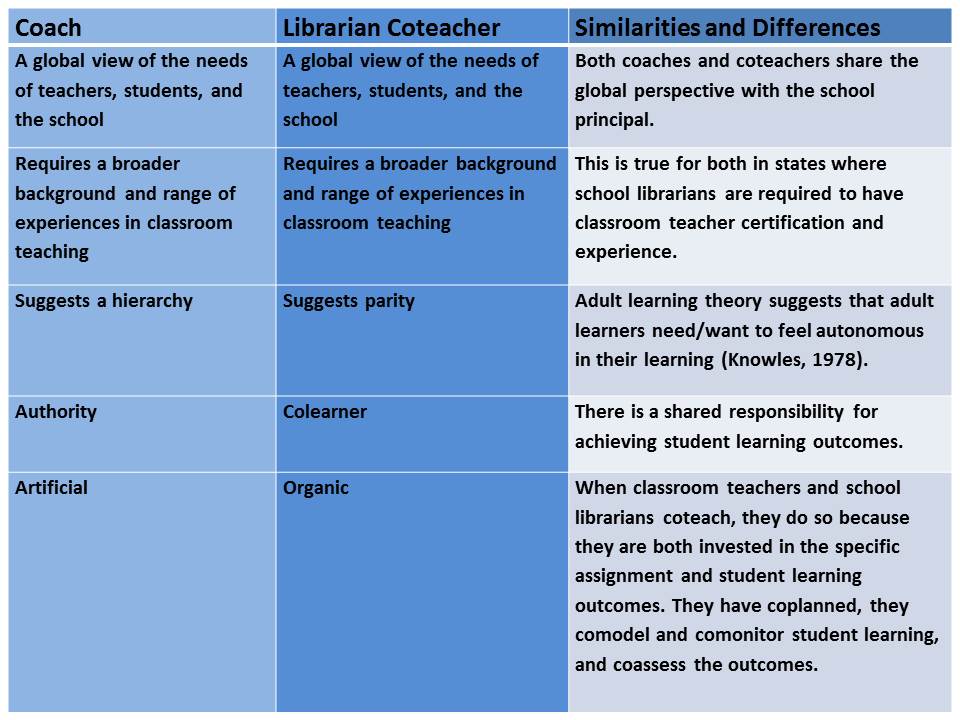 According to an article in the Daily Freeman, Kingston, New York spent $750K to hire five elementary and two middle school literacy coaches. When I read the article about how these coaches help facilitate literacy across the curriculum, motivate students through research centers, and provide job-embedded professional development to teachers, I wondered why school librarians aren’t being used in this capacity.
According to an article in the Daily Freeman, Kingston, New York spent $750K to hire five elementary and two middle school literacy coaches. When I read the article about how these coaches help facilitate literacy across the curriculum, motivate students through research centers, and provide job-embedded professional development to teachers, I wondered why school librarians aren’t being used in this capacity.
In the past ten years, while there has been a decline in the number of school librarians, there has been an increase in “coaching” positions such as instructional, literacy, reading, and technology coaches or integration specialists.
I served as a literacy coach for one year. I had been a successful coteacher as a school librarian prior to taking that position. I erroneously thought I could make a greater impact on instruction through an “authoritative” role; the teachers had to work with me. I returned to school librarianship the following year because, in my experience, coteaching was more effective than coaching, most notably in terms of the impact on adult learning—mine and that of my classroom teacher colleagues.
From where I sit on the “library team,” maximizing the school librarians’ impact through “coteaching” has several advantages over “coaching.”
What is your experience?
References
Hicks, M. A.. “School News.” Clip art licensed from the Clip Art Gallery on DiscoverySchool.com.
Knowles, M. (1978). The adult learner: A neglected species. (2nd ed.). Boston: Gulf.


This is a great comparison of coaches and co-teaching librarians. I do think there is a need for both, because some teachers – especially new teachers, or teachers new to a discipline or district – need that “global” view described in the chart. An extra set of eyes on what they are doing can be very useful.
But when it comes to literacy, research, integration of technology, etc., then classroom teachers absolutely should go first to their school librarian. That is, they should go to the librarian, assuming that that position exists in their school. Unfortunately, we return yet again to the consequences of short-sightedness with regard to funding teaching positions in a school. The fact that librarians rarely have the ability to measure their impact through test scores and other quantitative measures, makes it difficult to demonstrate their critical importance to student success, and teacher professional development.
What do we do about it? Continue to implement Ross Todd’s and David Loertscher’s methods of documenting impact on student learning in qualitative ways. Don’t give up! Keep doing it!
Deborah Owen
http://www.einsteinssecret.net/
This is a great comparison of coaches and co-teaching librarians. I do think there is a need for both, because some teachers – especially new teachers, or teachers new to a discipline or district – need that “global” view described in the chart. An extra set of eyes on what they are doing can be very useful.
But when it comes to literacy, research, integration of technology, etc., then classroom teachers absolutely should go first to their school librarian. That is, they should go to the librarian, assuming that that position exists in their school. Unfortunately, we return yet again to the consequences of short-sightedness with regard to funding teaching positions in a school. The fact that librarians rarely have the ability to measure their impact through test scores and other quantitative measures, makes it difficult to demonstrate their critical importance to student success, and teacher professional development.
What do we do about it? Continue to implement Ross Todd’s and David Loertscher’s methods of documenting impact on student learning in qualitative ways. Don’t give up! Keep doing it!
Deborah Owen
http://www.einsteinssecret.net/
Thank you for your thoughtful comment, Deborah, and for your sage advice. I believe you and Drs. Todd and Loertscher are correct about the importance of evidence-based practice to the work of school librarians and the future of the profession as well. And the best was to collect that evidence… IMHO… is through coteaching standards-based lessons! For 21 lesson plan examples in each of my two professional books (for a total of 42), see http://storytrail.com
Best,
Judi
Thank you for your thoughtful comment, Deborah, and for your sage advice. I believe you and Drs. Todd and Loertscher are correct about the importance of evidence-based practice to the work of school librarians and the future of the profession as well. And the best was to collect that evidence… IMHO… is through coteaching standards-based lessons! For 21 lesson plan examples in each of my two professional books (for a total of 42), see http://storytrail.com
Best,
Judi